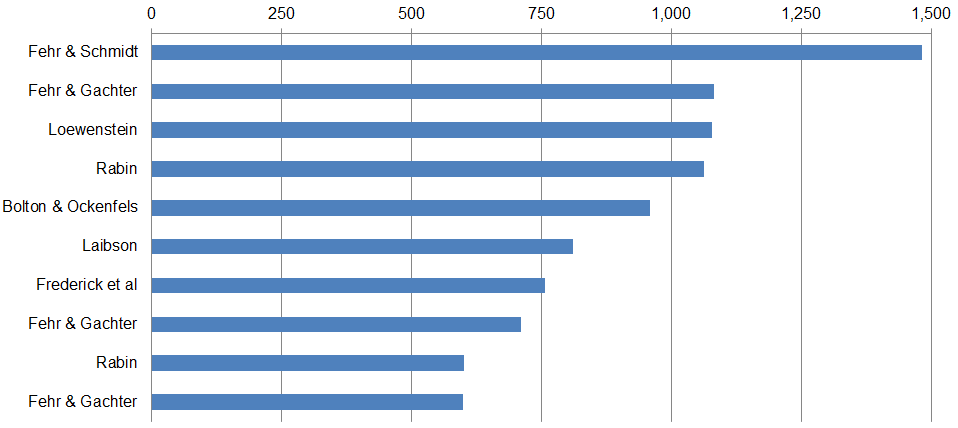Some preliminary notes and concessions:
- This list contains only academic papers, not books. No 'Theory of Moral Sentiments', no 'Nudge'.
- Older papers will of course have more citations.
- There are some works whose influence is far greater than their citation count; 'Freakonomics' for example.
A. All Time Most Cited Papers (Web of Science)
1. Prospect Theory (Kahneman & Tversky 1979)
2. The Framing of Decisions and the Psychology of Choice (Kahneman & Tversky 1981)
3. A Behavioral Model of Rational Choice (Simon 1955)
4. Advances in Prospect Theory (Kahneman & Tversky 1992)
5. A Theory of Fairness, Competition and Cooperation (Fehr & Schmidt 1999)
6. Risk, Ambiguity and the Savage Axioms (Ellsberg 1961)
7. Mental Accounting and consumer choice (Thaler 1985)
8. Towards a Positive Theory of Consumer Choice (Thaler 1980)
9. Risk as Feelings (Loewenstein 2001)
10. Incorporating Fairness into Game Theory and Economics (Rabin 1993)
Kahneman and Tversky wrote an incredible 3 of the 4 most cited papers, nestling either side of Herb Simon, the man who is generally considered to have coined the term 'bounded rationality' in the late 1940s. Ellsberg, Fehr & Schmidt, Thaler, Loewenstein and Rabin round out the list.
B. All Time Most Cited Papers (Google Scholar)
1. Prospect Theory (Kahneman & Tversky 1979)
2. The Framing of Decisions and the Psychology of Choice (Kahneman & Tversky 1981)
3. A Behavioral Model of Rational Choice (Simon 1955)
4. Advances in Prospect Theory (Kahneman & Tversky 1992)
5. A Theory of Fairness, Competition and Cooperation (Fehr & Schmidt 1999)
6. Does the Stock Market Overreact? (Thaler & Bondt 1985)
7. Risk, Ambiguity and the Savage Axioms (Ellsberg 1961)
8. Incorporating Fairness into Game Theory and Economics (Rabin 1993)
9. ERC: A Theory of Equity, Reciprocity, and Competition (Bolton & Ockenfels 2000)
10. Mental Accounting and consumer choice (Thaler 1985)
Prospect Theory far and away the most cited again: the breadth of its influence is beautifully represented in this infographic. Richard Thaler, who Kahneman has called "the person who really created behavioral economics", has 2 of of the top 10 spots using this metric.
C. Most Cited Papers 1993-2013 (Web of Science)
In an effort to reduce the dominance of the seminal papers of the late '70s and early '80s, I create an arbitrary cut-off date of 20 years ago and examine the Top 10 most cited papers since 1993. It is much more likely here that I have omitted a paper incorrectly. If you notice something missing please let me know so I can update it.
1. A Theory of Fairness, Competition and Cooperation (Fehr & Schmidt 1999)
2. Altruistic Punishment in Humans (Fehr & Gachter 2002)
3. Risk as Feelings (Loewenstein 2001)
4. Incorporating Fairness into Game Theory and Economics (Rabin 1993)
5. ERC: A Theory of Equity, Reciprocity, and Competition (Bolton & Ockenfels 2000)
6. Golden eggs and hyperbolic discounting (Laibson 1997)
7. Time discounting and time preference: A critical review (Frederick, Loewenstein & O'Donoghue 2002)
8. Cooperation and punishment in public goods experiments (Fehr & Gachter 2000)
9. Psychology and economics (Rabin 1998)
10. Fairness and retaliation: The economics of reciprocity (Fehr & Gachter 2000)
D. Most Cited Papers 1993-2013 (Google Scholar)
1. A Theory of Fairness, Competition and Cooperation (Fehr & Schmidt 1999)
2. Incorporating Fairness into Game Theory and Economics (Rabin 1993)
3. ERC: A Theory of Equity, Reciprocity, and Competition (Bolton & Ockenfels 2000)
4. A model of investor sentiment (Barberis, Shleifer & Vishny 1998)
5. Golden eggs and hyperbolic discounting (Laibson 1997)
6. Time discounting and time preference: A critical review (Frederick, Loewenstein & O'Donoghue 2002)
7. Risk as Feelings (Loewenstein 2001)
8. Altruistic Punishment in Humans (Fehr & Gachter 2002)
9. Psychology and economics (Rabin 1998)
10. Economics and Identity (Akerlof & Kranton 2000)
Using the Google Scholar metrics, Ernst Fehr & Klaus Schmidt's paper moves from the number 5 of all time to the number 1 of the last 20 years, not to mention Fehr's other paper in the top 10. Rabin, Bolton & Ockenfel and Barberis, Shleifer & Vishny round out the top 5 with some well-known papers.




3 comments:
Thank you! A great resource. I thought I was just biased in thinking Kahneman & Tversky were responsible for avout 30% of all significant research in our field..
Interesting statistics. Of course, citations do not show the whole impact of a paper but they are the best available quantitative metric and offer some insight into a paper's impact. I am surprised that the widely cited Barberis/Shleifer/Vishny paper on Investor Sentiment in the Journal of Financial Economics 1998 is not among the top ten. I guess it should also count as a behavioral economics paper. It also appears to me that Google Scholar misnames the Fehr/Gächter 2005 paper. It is in fact the "Altruistic Punishment in Humans" paper, published in Nature 2001 or 2002, for which Web of Science citations exist.
Anon,
Thanks for pointing out those omissions; I didn't have that B/S/V paper in my data but it's outside the top 10 anyway.
Post a Comment